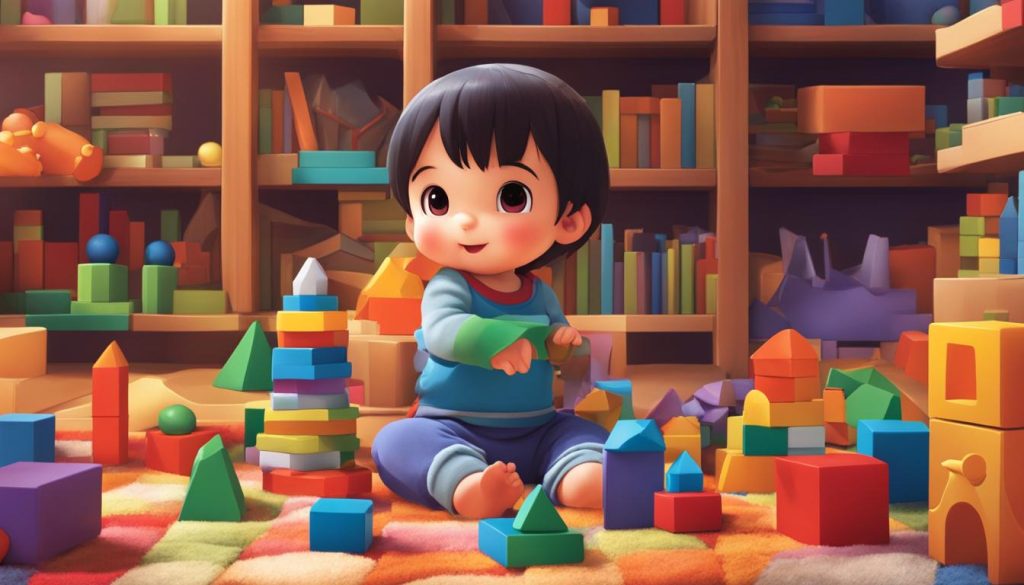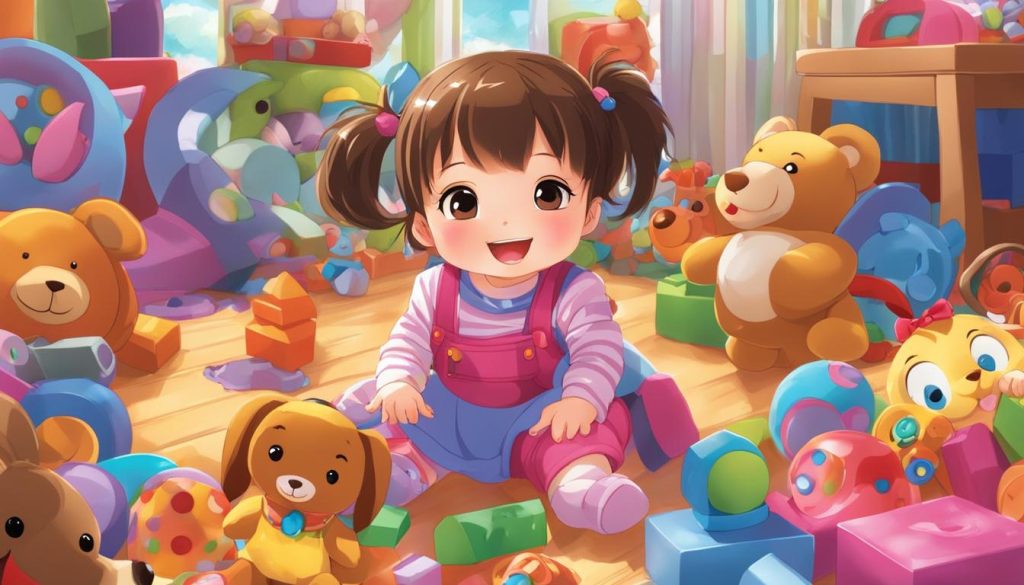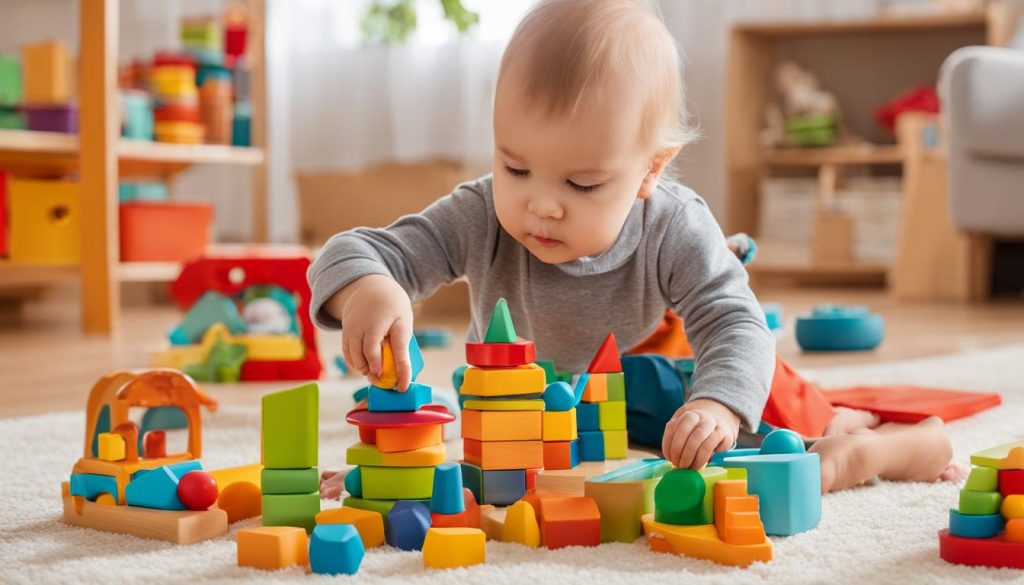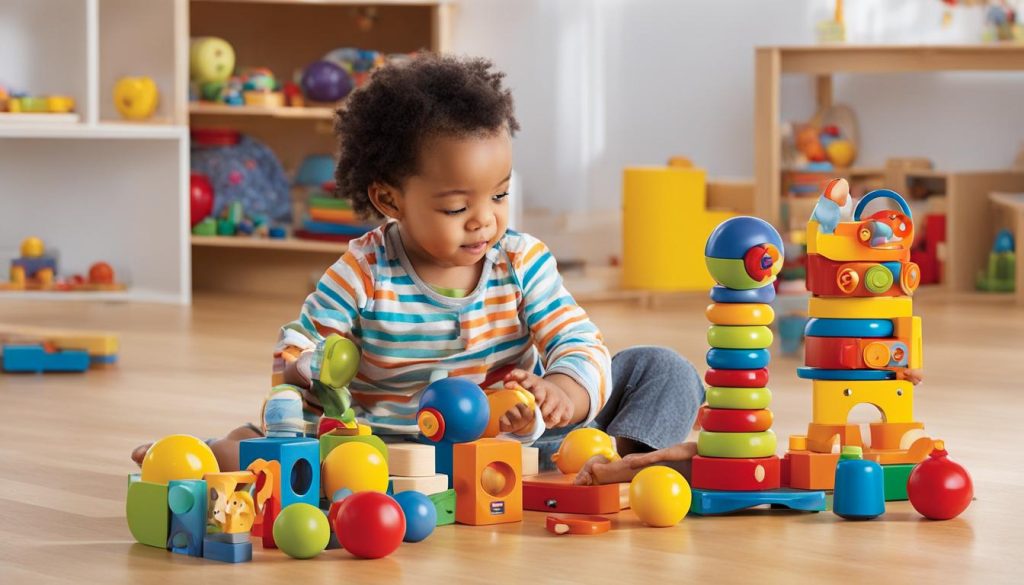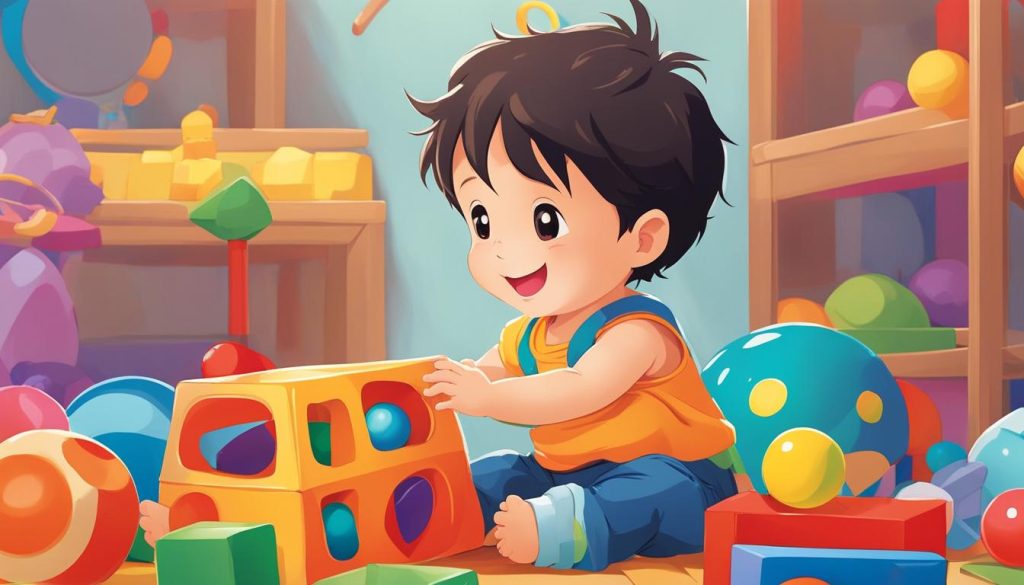Welcome to my article on the importance of baby blocks in early childhood development. As a professional in the field, I understand the significance of educational materials, such as baby blocks, for newborns. These toys play a crucial role in their early cognitive and motor skill development.
Experts agree that educational play has a profound impact on the overall growth of babies. By engaging with baby blocks, children not only have fun but also enhance their problem-solving abilities, imagination, and self-expression. Through block play, they also develop important mathematical and scientific concepts, fostering a strong foundation for future learning success.
Are you curious to learn more about the benefits of block play and how it supports the holistic development of children? Stay tuned as I delve deeper into the stages of block play, explore its wide-ranging benefits, discuss its implementation in early childhood education, and emphasize the crucial role of educators in promoting learning through play.
The Stages of Block Play: From Exploration to Advanced Building
Block play is a dynamic and progressive activity that evolves as children grow and develop. It encompasses a series of stages that children typically go through as they engage with blocks, from simple exploration to advanced building. Understanding these stages can provide valuable insights into children’s cognitive and motor skill development.
1. Discovery
During the discovery stage, babies and toddlers are introduced to blocks and begin to explore them through their senses. They will pick up blocks, feel their texture, and even put them in their mouths. This stage is crucial for sensory development and helps children develop an understanding of the physical properties of blocks.
2. Stacking
In the stacking stage, children start to experiment with building structures using blocks. They stack blocks vertically and horizontally, learning about stability and balance. This stage is important for the development of fine motor skills and spatial awareness.
3. Balancing and Bridges
As children progress, they move on to creating more complex structures. They learn to balance blocks and start building bridges. This stage focuses on developing spatial reasoning and problem-solving skills.
4. Enclosures
In the enclosures stage, children develop the ability to create enclosed spaces with blocks. They build walls, rooms, and other structures that have defined boundaries. This stage fosters creativity and imagination.
5. Symmetry and Patterns
The symmetry and patterns stage is marked by children’s exploration of sorting, matching, and creating symmetrical designs with blocks. They begin to understand concepts like shape and pattern recognition. This stage supports mathematical and cognitive development.
6. Early Representational – Symbolic Play
As children enter the early representational stage, they start to assign names and roles to their structures. They engage in imaginative play and storytelling, using blocks to represent real-life objects and scenarios. This stage promotes language development and social interaction.
7. Advanced Representational
The advanced representational stage is characterized by the creation of complex buildings and the replication of familiar structures. Children engage in elaborate pretend play, constructing narratives and scenarios with blocks. This stage fosters advanced problem-solving skills and encourages creative thinking.
| Stage | Description |
|---|---|
| 1. Discovery | Exploration of blocks through the senses |
| 2. Stacking | Building towers and rows of blocks |
| 3. Balancing and Bridges | Creating balance and building bridges with blocks |
| 4. Enclosures | Building enclosed structures with blocks |
| 5. Symmetry and Patterns | Exploring symmetry and creating patterns with blocks |
| 6. Early Representational | Assigning names and roles to block structures |
| 7. Advanced Representational | Creating complex buildings and engaging in pretend play |
The Benefits of Block Play: A Holistic Approach to Learning
Block play offers a myriad of benefits for children’s holistic development. It goes beyond mere entertainment and serves as a valuable tool for nurturing various skills and abilities. Let’s explore some of the key advantages of block play:
Problem Solving
When children engage in block play, they are presented with challenges that require problem-solving skills. As they experiment with different block arrangements and structures, they learn to think critically, visualize solutions, and adapt their approaches. This process enhances their problem-solving abilities, fostering a sense of creativity and innovation.
Imagination and Self-Expression
Block play stimulates children’s imaginations and encourages open-ended, imaginative play. As they build and create using blocks, they can bring their ideas to life, constructing unique structures and scenarios. This form of self-expression allows children to demonstrate their learning across languages, fostering creativity and promoting communication skills.
Mathematics and Science
Block play provides opportunities for children to explore mathematical and scientific concepts in a hands-on and engaging manner. They can experiment with concepts such as size, shape, measurement, balance, and symmetry while building with blocks. This hands-on exploration helps develop a solid foundation for understanding mathematical and scientific principles.
Continuity and Permanence
Through block play, children develop an understanding of continuity and permanence. As they construct structures that can stand for extended periods, they gain a sense of accomplishment and learn to anticipate the lasting impact of their creations. This awareness of continuity and permanence lays the groundwork for future learning and contributes to the development of spatial sense and motor abilities.
| Benefits of Block Play | Keywords |
|---|---|
| Problem solving | problem solving, critical thinking, creativity |
| Imagination and self-expression | imagination, self-expression, communication skills |
| Mathematics and science | mathematics, science, hands-on exploration |
| Continuity and permanence | continuity, permanence, spatial sense, motor abilities |
Implementing Block Play in Early Childhood Education
When it comes to early childhood education, the incorporation of block play is crucial for supporting children’s development in a holistic manner. Block play offers numerous benefits for children of all ages, fostering meaningful learning experiences that promote creativity and critical thinking. By incorporating block play into the curriculum, educators can create an enriching learning environment that nurtures various aspects of children’s growth.
One of the key benefits of block play in early childhood education is its ability to support children’s cognitive development. Through manipulating blocks, children engage in problem-solving activities that require critical thinking and spatial awareness. They learn to plan, experiment, and adapt their designs, developing important skills that lay the foundation for future academic success.
Furthermore, block play provides opportunities for children to express their creativity and imagination. They can build unique structures, explore different shapes, and experiment with various materials. This promotes self-expression and helps children develop a sense of pride and ownership over their creations. Additionally, block play encourages social interaction and collaboration, as children can work together to build and problem-solve.
To successfully incorporate block play in early childhood education, educators should create a supportive learning environment. This includes providing a variety of blocks, props tied to children’s interests, and open storage shelves that allow easy access to materials. Additionally, educators should allow ample space for building and rebuilding structures to foster children’s exploration and experimentation. By integrating block play into daily activities and curriculum, educators can maximize the benefits and create a well-rounded educational experience for children.
Benefits of Incorporating Block Play in Early Childhood Education:
- Promotes cognitive development through problem-solving and critical thinking
- Fosters creativity and imagination
- Enhances social interaction and collaboration
- Develops fine motor skills and spatial awareness
- Encourages language and communication skills
In conclusion, implementing block play in early childhood education is essential for supporting children’s development and promoting meaningful learning experiences. By incorporating block play into the curriculum and creating a supportive learning environment, educators can foster creativity, critical thinking, and social interaction. Block play not only enhances cognitive development but also nurtures children’s imagination and self-expression. By embracing the benefits of block play, educators can lay the groundwork for lifelong learning and development.
Conclusion
Block play is of utmost importance in fostering the development of children. Its impact on cognitive, physical, social, and emotional growth cannot be overstated. Through block play, children develop problem-solving skills, as they are encouraged to find creative solutions and think critically. Moreover, block play nurtures children’s imagination and self-expression, allowing them to follow their own ideas and collaborate with others in a truly engaging manner.
As educators, our role in promoting learning through play is crucial. We must recognize the significance of block play and incorporate it into our early childhood education practices. By providing opportunities for children to engage in meaningful play with blocks, we create an enriching learning environment that supports holistic development and lays the groundwork for future learning success.
Therefore, let us embrace the power of block play and create an environment that fosters exploration, experimentation, and discovery. By doing so, we empower children to become confident problem solvers, imaginative thinkers, and lifelong learners. Together, we can lay the foundation for a brighter future.
FAQ
What is block play?
Block play refers to the open-ended and creative activity of playing with blocks. It involves building structures and exploring different ways of arranging and manipulating blocks.
What are the stages of block play?
The stages of block play include discovery, stacking, balancing and bridges, enclosures, symmetry and patterns, early representational, and advanced representational.
What are the benefits of block play?
Block play offers numerous benefits such as promoting problem-solving skills, nurturing imagination and self-expression, developing mathematical and scientific concepts, fostering creativity, and promoting social skills.
How can block play be implemented in early childhood education?
Block play can be implemented by creating a supportive learning environment with a variety of blocks, props tied to children’s interests, open storage shelves, and ample space for building and rebuilding structures.
Why is block play important in early childhood education?
Block play is important in early childhood education as it fosters holistic development, promotes critical thinking and creativity, and serves as a foundation for future learning success.

